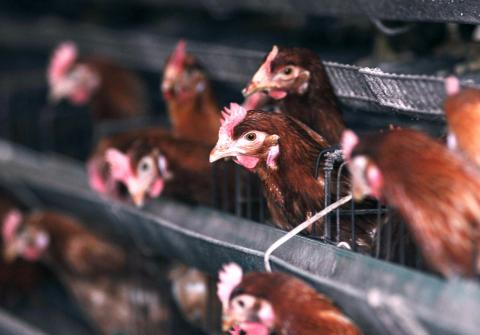|
CDC steps up
inspections after H7N9 cases in China
PRECAUTIONARY: The CDC advised people traveling
to China to avoid any form of contact with poultry and to inform officials of
any flu-related symptoms upon return
By Alison Hsiao / Staff reporter, with CNA

Chickens are seen in a chicken
farm in Zouping, east China`s Shandong province on Monday.
Photo: AFP
Chinese health authorities on Saturday
confirmed three cases of a strain of avian flu that had not been found in humans
before.
Two of the patients have died in Shanghai and one is still critically ill in
Anhui Province, the Centers for Disease Control (CDC) said yesterday.
CDC Deputy Director-General Chou Jih-haw (©P§Ó¯E) said that 88 people have had
close contact with the three patients, but the Chinese health agency said that
so far they have not displayed any symptoms.
Chou said that although three human cases of H7N9 infection have been confirmed,
it is still not clear whether this strain of avian influenza can be transmitted
though human-to-human contact.
¡§In Taiwan, we used to find H7N3 and H7N7 virus infections in poultry, but that
has not been the case with H7N9,¡¨ Chou said. ¡§The CDC has tested more than 3,000
cases of influenza infection since October last year, but has yet to find any
cases of the H7N9 virus. Of the 136 cases of unexplained pneumonia investigated,
three were found to be H3N2 and one H1N1; again none tested positive for H7N9.¡¨
Although most avian influenza viruses do not affect people, some do. One of
these is H5N1, a highly pathogenic avian influenza virus.
¡§As of March 4, WHO data showed that there have been 622 confirmed cases of H5N1
infection, as a result of which 371 people died, amounting to a mortality rate
of almost 60 percent,¡¨ Chou said.
The CDC said it has stepped up inspections and monitoring of people arriving
from China, Hong Kong and Macau. Those who develop symptoms of infection or have
been in contact with poultry are to be sent to hospitals to be tested for the
virus and not discharged until cleared of infection.
In addition, he said that people who plan to travel to China ¡§should avoid any
form of contact with poultry and if they have developed any of the
above-mentioned symptoms, they should inform officials at ports of entry when
they return.¡¨
CDC Director-General Chang Feng-yi (±i²l¯q) told a legislative hearing that while
Taiwan has no recorded cases of human H7N9 infections, precautionary measures
have been stepped up in light of the cases in China.
Immigration officials at Taiwan Taoyuan International Airport have been asked to
intensify monitoring and inspection of passengers from China, Hong Kong and
Macau, Chang said.
Meanwhile, the government has extended public access to subsidized anti-viral
influenza drugs until the end of this month, as a precaution against a possible
outbreak of the virus.
Although there is no specific vaccine against the virus, existing information
shows that H7N9 infection can be treated with Tamiflu, Chang said.
The CDC has been monitoring cases of pneumonia of unknown etiology and flu-like
illnesses on a regular basis, but has not detected any H7N9 infections so far,
he said.
|
![]()
![]()
![]()